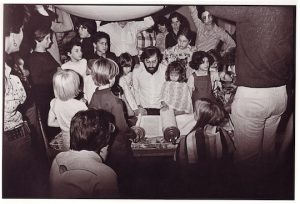It seemed normal until it was remarkable. I knew Jews in the South often went to Episcopal private schools, much the way Jews attend Friends schools in this area. I knew because I was one of them, a proud graduate of St. John’s School. I was just another example of some narrative connection between Jews and education. Five years ago, though, my story was no longer a data point; five years ago, I discovered there was something more to the story.
In a room of about 20 rabbis from various Jewish movements (Orthodox, Conservative, Reform, Reconstructionist, and more), four of us slowly found each other. Each breakout session during our fellowship training in an office on the East Side of Manhattan meant another connection made. By the end of our cohort conference, it was clear that 20 percent of those rabbinic fellows grew up in Texas, each in a different city, and each graduating from the Episcopal (or close to it) private school in those cities: St. Stephen’s in Austin; St. Mary’s Hall in San Antonio; St. John’s in Houston; and Greenhill in Dallas. Suddenly, what each of us had seen as a given in our upbringing turned into a discovery.
Not only were we all Jews who had gone to similar schools (all part of the same arts and sports associations), not only were we all rabbis, we were Rabbis Without Borders fellows. We were the kind of Jews who go from elite private high schools eventually to become rabbis and to become the kind of rabbis who are deeply inclined to “use Jewish wisdom as a source of wellbeing for anyone anywhere.” Add to that seeming rarity the outsized proportion within our cohort and we appeared noteworthy.
Our stories combined to indicate that our family’s emphasis on education was not solely about rising up in a meritocratic society. We were not just going to the best schools to get into the best colleges. Or rather, even if we did go to our high schools for that reason, we left college as people for whom wisdom matters more than knowledge and for whom parochialism is a source of strength in the universal public square. Education for us was as much or more about the soul than it was about the mind.
Today is the Global Day of Jewish Learning (http://www.theglobalday.org), organized by Rabbi Adin Steinsaltz and his Aleph Society. Predicated on the idea that Jewish learning is not just for scholars, rabbis, and religious elites, the Global Day of Jewish Learning is a reminder that education is essential for everyone. This education is not about acquiring or demonstrating knowledge, that is too narrow. This education is about the joint experience of accessing a communal inheritance. The Global Day of Jewish Learning is about creating bonds between people, of connecting us across the globe and across time and breaking down walls of division.
Why is learning so important to Jews? It is not, as the anti-Semitic trope would have, that Jews are more intelligent than others; we are not. It is not just to get ahead; Einstein struggled with school and Zuckerberg dropped out. Learning is so important to Jews because it opens the door to wellbeing. Learning provides a grounding and connectedness to one’s past and to others in the present. Learning nourishes the imagination, inspires creativity, and questions the status quo. In short, learning is important because it leads to thriving.
This Global Day of Jewish Learning find something remarkable, something beautiful or ugly in keeping with this year’s theme, or study the following rabbinic teaching and begin thriving in your own way: “Learning is greater for it leads to action” (Talmud, Tractate Kiddushin, 40b).
** The opinions expressed are those of the author and do not necessarily reflect those of the ownership or management of Chadds Ford Live. We welcome opposing viewpoints. Readers may comment in the comments section or they may submit a Letter to the Editor to editor@chaddsfordlive.com
About Rabbi Jeremy Winaker
Rabbi Jeremy Winaker is the executive director of the Greater Philadelphia Hillel Network, responsible for West Chester University, Haverford, Bryn Mawr, and other area colleges. He is the former head of school at the Albert Einstein Academy in Wilmington and was the senior Jewish educator at the Kristol Hillel Center at the University of Delaware for four years. Rabbi Winaker lives in Delaware with his wife and three children.


Comments